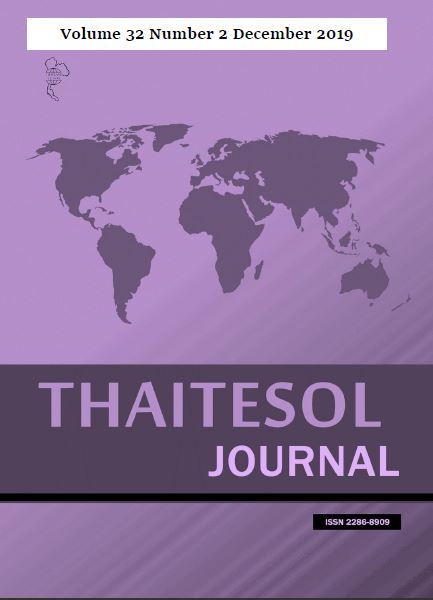Vietnamese Teachers’ Perceptions of Integrating Intercultural Communicative Competence (ICC) into Business English Teaching
Main Article Content
Abstract
This is a case study of the College of Foreign Economic Relations (COFER) (Ho Chi Minh City, Vietnam) with six Business English teachers as participants. The study was done to explore the teachers’ perceptions of teaching Intercultural Communicative Competence (ICC) to the Business English students through their understanding of ICC and ICC teaching practices. The data were collected via classroom observations, in- depth interviews, and analyses of syllabi, lesson plans and two Business English textbooks in current use. Inductive analysis was used to analyze the data. The findings revealed that the teachers did not perceive ICC adequately and neither did they teach ICC sufficiently in spite of acknowledging the importance of ICC in Business communication. The study not only enabled Business English teachers to gain a deeper insight into all the aspects of ICC but also provided educators with a good source of data for more efficient policies to develop ICC teaching in Business English education.
Article Details
Materials in THAITESOL JOURNAL may be photocopied for educational purposes. Under no circumstances may any part of this journal be photocopied for commercial purposes.
References
Perceptions of the Importance of Intercultural Communicative Competence in Saudi EFL
Education. ProQuest Dissertations Publishing. Retrieved from
http://search.proquest.com/docview/1666397044/
Birello, M. (2012). Teacher cognition and Language Teacher Education: Beliefs and
Practice. A Conversation with Simon Borg. Bellaterra Journal of Teaching & Learning
Language & Literature, 5(2), 88-94.
Borg, S. (2003). Teacher cognition in language teaching: A review of research on what
language teachers think, know, believe, and do. The Language Teaching Journal, 36, 81-
109.
Brown, H. D. (1994). Principles of Language Teaching and Learning (3rd ed.). New Jersey:
Prentice Hall Regents.
Byram, M., & Zarate, G. (1994). Definitions, Objectives and Assessment of Sociocultural
Competence. Council of Europe: Strasbourg.
Byram, M. (1997). Teaching and Assessing Intercultural Competence. Clevedon, UK:
Multilingual Matters.
Byram, M. (2008). From Foreign Language Education to Education for Intercultural
Citizenship: Essays and Reflections. Clevedon: Multilingual Matters.
College of Foreign Economic Relations- COFER (2014). Business English Curriculum. Ho
Chi Minh City, Vietnam
Cotton, D., Falvey, D., & Kent, S. (2012). Market Leader (3rded). New York: Pearson
Education Limited.
Creswell, J. W. (2013). Research Design: Qualitative, Quantitative, and Mixed Methods (4th
ed.). Thousand Oaks, Calif.: SAGE Publications
Crozet, C., & Liddicoat, A. J. (1999). The challenge of intercultural language teaching:
Engaging with culture in the classroom. In J. Lo Bianco, A. J. Liddicoat, & C. Crozet
(Eds.), Striving for the Third Place: Intercultural Competence Through Language
Education (pp. 113-125). Melbourne, Australia: Language Australia.
Deardorff, D. K. (2006). Identification and assessment of intercultural competence as a
student outcome of internationalization. Journal of Studies in International Education,
10(3), 241-266. doi:10.1177/1028315306287002
Frendo, E. (2005). How to Teach Business English. New York: Longman.
Halverson, J., R., (1985). Culture and vocabulary acquisition: A proposal. Foreign language
Annals, 18 (4), 327-329.
Lázár, I., Kriegler, H. M., ,Lussier, D., Matei, S. G., & Peck, C. (Eds). (2007). Developing
and Assessing Intercultural Communicative Competence - A Guide for Language
Teachers and Teacher Educators. Council of Europe, Austria.
Liddicoat, A. J. (2008). Pedagogical practice for integrating the intercultural in language
teaching and learning. Japanese Studies, 28(3), 277‐290.
Liddicoat, A. J., Papademetre, L., Scarino, A., & Kohler, M. (2003). Report on Intercultural
Language Learning. Canberra: Department of Education, Science and Training.
Louhiala-Salminen, L.,& Kankaanranta, A. (2013). “What language does global
businessspeak?” – The concept and development of BELF. Ibérica 26, 17-34.
McMillan, H. J., & Schumacher, S. (1993). Research in Education- A Conceptual
Introduction. Harper Collins College Publishers, New york.
Mosa Reza Banafsheh, Mohadese Khosravi, & Mavadat Saidi. (2013). In pursuit of
intercultural communicative competence in EFL context: Exploring Iranian English
teachers’ perceptions. Journal of Applied Linguistics, 6(13), 65–83. Retrieved from
https://doaj.org/article/e534723183ea4465b6f1f3167172d46a
Newton, J., & Shearn, S. (2010). An evidence-based framework of principles for effective
intercultural teaching & learning. In J. Newton, E. Yates, S. Shearn & W. Nowitzki
(Eds), Implications for Effective Teaching & Learning. Report to the Ministry of
Education. Wellington, New Zealand. Retrieved from
http://www.educationcounts.govt.nz/publications/curriculum.
Osman, H., Popal, S., Capitelli, S., & Katz, S. (2015, January 1). Investigating English
Teachers’ Perceptions of Intercultural Communicative Competence in the Kingdom of
Saudi Arabia.ProQuest Dissertations Publishing. Retrieved from
http://search.proquest.com/docview/1766582096/
Sercu, L., Bandura, E., Castro, P., Davcheca, L., Laskaridou, C. Lundgren, U., Garcia, M., &
Ryan, P. (Eds.) (2005). Foreign Language Teachers and Intercultural Competence: An
International Investigation. Clevedon, UK: Multilingual Matters.
Sweeney, S. (2011). English for Business Communication- Student’s Book. Cambridge:
Cambridge University Press.
Weaver, G. (1993). Understanding and coping with cross-cultural adjustment stress. In R.M. Paige (Ed.), Education for the Intercultural Experience (pp. 137-168). Yarmouth,
Maine: Intercultural Press.


